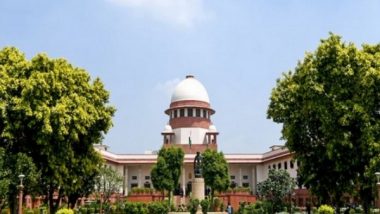New Delhi [India], December 20 (ANI): A plea has been filed in the Supreme Court seeking preliminary inquiry in cases involving serious allegations such as a dowry, sexual offences and the implementation of an Uniform Civil Code.
"The recent incident involving Atul has profoundly impacted everyone, raising serious questions about our law and order system. It forces us to reconsider whether the rights provided to women are being used responsibly or if, in some cases, they are being misused as tools of harassment. Misuse of such rights can become a weapon that inflicts severe mental and emotional harm, sometimes driving individuals to despair. Hence Instant PIL," the petition read.
Also Read | Kerala Shocker: UP Woman Arrested for Allegedly Killing Stepdaughter in Nellikuzhi.
The petition was filed by Rameshwar and Mohd. Haider through advocate Pawan Prakash Pathak and Advocate Richa Sandilya.
In the petition, the petitioner has sought consolidation of Legal Proceedings and urged that in cases involving allegations of dowry harassment, all pending proceedings between the same parties should be consolidated and adjudicated jointly to ensure judicial efficiency and avoid conflicting decisions at a mutual jurisdiction, which the Family District Court judge may decide.
The petitioner has sought for provision for virtual hearings and urged that when one party resides outside the territorial jurisdiction of the court or in another state, appropriate video conferencing facilities should be made available to facilitate participation in legal proceedings without undue inconvenience.
The petition said that requirement for preliminary inquiry and urged in cases involving serious allegations such as a dowry, sexual offence under the Indian Penal Code or offence under BNSS, an FIR should not be registered solely based on a complaint statement as a gospel truth against the entire family members who also has A preliminary inquiry to establish prima facie evidence should be made a mandatory prerequisite, the petitioner said.
The petitioner also sought implementation of a Uniform Civil Code: "That the instant problem may also be resolved through the Uniform Civil Code because in personal laws the issue of alimony and it's amount is not settled and recently this Hon'ble Court has fixed pointers which may be taken into consideration for deciding the same but again the same is discretionary power of the Court to fix the one-time alimony or maintainace and therefore to address this systemic social issue, the enactment of a Uniform Civil Code (UCC) is essential to ensure consistent legal standards across all communities in India and framing of law on this subject is also prayed by the respondent no. 1 (union government) through this petition, the petition said.
Rameshwar is a law-abiding citizen of this country and for the last 20 years facing the court trial in the matrimonial case of Divorce and miscellaneous proceedings arising therefrom in the state of Rajasthan.
Whereas Mohd. Haider from the last two years facing trial and also the family member of the wife never allowed the husband to see the face of the deceased kid all his life time from birth till he passed away and it is gross abuse of fundamental right & process of law on part of the respondent-wife and family.
Rameshwar said that he got married to his wife on April 29, 2004, as per Hindu rites. Irreconcilable temperamental differences led to matrimonial disputes shortly after, resulting in their separation on May 21, 2004. The petitioner later filed for dissolution of marriage under Section 13 of the Hindu Marriage Act before the Additional District Judge. His wife, in turn, filed a criminal case against the appellant under Sections 498A, 325, 504 of the IPC, and Sections 3/4 of the Dowry Prohibition Act. Despite oral and documentary evidence, the court dismissed the dissolution petition on August 7, 2010, the petition said.
He further added he appealed to the Jaipur High Court which directed multiple mediation attempts in 2013, 2014, 2017, and 2021--all of which failed. The matter, transferred between benches multiple times, remains unresolved as of 2024, highlighting the protracted litigation and its impact on litigants and also a violation of the fundamental right of the petitioner, the petitioner Rameshwar said. (ANI)
(This is an unedited and auto-generated story from Syndicated News feed, LatestLY Staff may not have modified or edited the content body)













 Quickly
Quickly
















